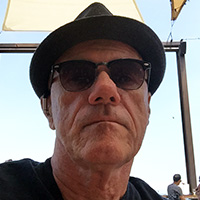UNV 101: Section 14
Latest News
discover
your passion
UNV 101 (First-Year Seminar): FALL 2024
ENROLL NOW ➢ Login to MyCSUDH and Sign-up for Course
UNV 101: Section 14
Age of Introspection: Gaming and the Consequences of Digital Learning
Day/Time: TR, 10:00 AM-11:15 AM
Instructor: J Menary


Dr. John Menary
Earth Sciences
Faculty Bio
Course Description:
Imagine if students had access to an app which predicted their level of success at completing a degree by the end of the second semester of their first year of study? Could such an app help students customize their undergraduate education to better suite their dynamic career goals? Incoming students are a wealth of educational-environmental information - factors with potential consequences upon the educational system. These environmental factors influence course choices and program decisions as well as retention. Students enrolled in this course should have some knowledge of gaming, a smart device (phone, tablet or laptop) and a desire to communicate with other undergraduate students.
Course by Major:
This course may be particularly interesting to you if you are interested in one of the following majors.
- Advertising and Public Relations
- Art and Design
- Behavioral Science
- Communications
- Computer Technology
- Digital Media Arts
- Film, Television, and Media
- Geography
- Information Technology
- Liberal Studies
- Sociology
- Theater Arts
- Game Studies-Visual technology
Biography of Dr. John Menary
Formerly a resident of Cobourg, Ontario, Canada, I was a first-generation recipient of an Honors undergraduate degree in Geography at the University of Toronto. While in attendance there, I was also employed as a Research Assistant on a study into rural change in the Province. For two summers I was similarly employed to conduct a survey of municipal recreation facilities for the Canadian Government’s Department of Health. After graduation I relocated to Lincoln, Nebraska where I completed my Masters in Geography and a Masters in Community & Regional Planning at the University of Nebraska. Here I served in the capacity of an Associate Principle Investigator responsible for designing a Computerized Regional Planning Environmental Information System for the State of Nebraska.
From 1977 to 1982 I completed my doctorate in geography with minors in architecture and sociology. While completing the dissertation I spent a year teaching at the University of Idaho as an Assistant professor. From 1982 to 1983, I served as an Assistant Professor in the Department of Geography and Urban Planning at the University of Saskatchewan in Saskatoon, Saskatchewan in Canada.
Leaving the higher education sector for a period of 17 years, I worked in the private sector initially in the retail then marketing sectors in various capacities: managing retail bookstores, purchasing books, editing and marketing books. Returning to higher education in 2000, I have taught various geography courses in different community colleges in Southern California until my appointment in 2005 at CSUDH where my responsibility is for the design of courses and instruction in Human Geography [100], Physical Geography [200], World Geography [350], California Geography [359], North America [350] and Geomorphology [310], as well as Science, Math & Technology [310] and Natural Hazards [312] and Cultural Pluralism [SBS 318]. During Fall 2015, in addition to the University Life Seminar, I will be instructing two undergraduate 100 sections of Human Geography plus junior-level courses in Cultural Pluralism [SBS318] and Science Math and Technology [SMT310].
Continuing to pursue my research interests in geography, social policy and higher education, I have presented, on average, two papers each year to the Association of Pacific Coast Geographers and California Geographical Society. Also, when feasible, I present a paper in the annual meetings of the Association of American Geographers. Each paper contributes a chapter in a forthcoming book on the relevancy of geographical science to reimagining higher education, tentatively titled The Isolated Education System. The book challenges currently dominant perspectives on the educational system in the USA.